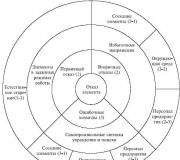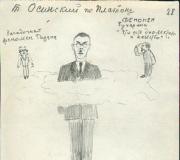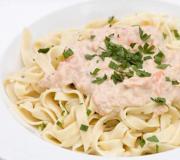"Hakuna Matata" - what does it mean? Let's remember the fascinating cartoon "The Lion King". English in songs: Hakuna matata from the cartoon The Lion King Motto of Timon and Pumbaa
As children, we all loved Disney cartoons and hummed familiar melodies, often not quite understanding what they were talking about? It's time to lift the veil of secrecy! Let's find out today what they are singing about Timon and Pumbaa in the cartoon "The Lion King"(The Lion king).
History of the song Hakuna Matata
Song “Hakuna matata” transcribed into Russian as “akuna matata” or “hakuna matata”, and translated from Swahili as “without worries”. It is this style of carefree life that Timon and Pumbaa promote. The music for this song was written by Elton John himself, and the lyrics by Tim Rice. This song from the cartoon took 99th position among the best songs in the history of cinema.
The song about hakuna matata (or hakuna matata) is not only heard in The Lion King. It was re-sung several times and even used in other films (for example, in the cartoon “Toy Story”). Well, the phrase hakuna matata itself has long become a symbol of life without problems.
Let's finally find out what Timon and Pumbaa really sing.
Hakuna Matata lyrics
Hakuna Matata
Hakuna Matata!
Hakuna Matata?
Yeah. It's our motto!
What's a motto?
Nothing. What's a-motto with you?
Those two words will solve all your problems
That's right. Take Pumbaa for example
Why, when he was a young warthog...
When I was a young wart hog
Very nice
Thanks
He found his aroma lacked a certain appeal
He could clear the savannah after every meal
I"m a sensitive soul though I seem thick-skinned
And it hurt that my friends never stood downwind
And oh, the shame
He was ashamed
Thought of changing" my name
What's in a name?
And I got downhearted
How did ya feel?
Everytime that I...
Hey! Pumbaa! Not in front of the kids!
Oh. Sorry
Hakuna Matata! What a wonderful phrase
Hakuna Matata! Ain't no passing craze
It means no worries for the rest of your days
It's our problem-free philosophy
Hakuna Matata!
(Repeat)
It means no worries for the rest of your days
It's our problem-free philosophy
Hakuna Matata!
(Repeat)
Words and expressions in English to translate the song

- Problem-free philosophy - philosophy of freedom from problems
- Motto – motto, slogan. Hakuna Matata is the motto of this lively couple, which they explain to the future lion king.
- What's a-motto with you? – here Timon plays with the phrase “What’s the matter with you?” - “What’s wrong with you?” It seems to him that the word “motto” sounds similar to the word “matter” (deed, subject). So if you want to translate this piece literary, then you need to think carefully. Some authors even offer an option -play on words “Motto - be surprised!”
- Craze – passion, mania. However, for Timon and Pumbaa this hobby does not go away. So they sing - no passing craze (not a passing hobby, an eternal fad)
- Take Pumbaa for example – Take Pumbaa as an example. Well, or “take, for example, Pumbaa.” Take me for example – take me, for example.
Warthog is a warthog, a species of African wild pig. Pumbaa belongs to this species - Aroma - usually this word conveys some pleasant smell, fragrance. But here Timon is simply being ironic and softening Pumbaa’s situation a little
- Appeal is a very ambiguous word. It can be translated in different ways: from appeal to attractiveness. Here it is translated as “attractiveness.” He found his aroma lacked a certain appeal - He discovered that his aroma lacked a certain appeal.
- Savannah - savannah
- To clear - to clean, remove, empty
- Sensitive soul - sensitive, very gentle, touchy (Sensitive soul - gentle soul)
- Thick-skinned - thick-skinned
- I "m a sensitive soul though I seem thick-skinned - there is an interesting language game going on here. Thick-skinned has the same meaning as our word “thick-skinned,” that is, “unemotional.” But as we already understood, this is not about Pumbaa . He just has a sensitive soul “tender soul”. In this case, the word thick-skinned has a literal meaning - “thick skin”. And this is not surprising, because we are talking about a pig. So the whole phrase will be translated as: “ I have a vulnerable soul, although I have thick skin.”
- Downwind – downwind, Upwind – against the wind
- To be ashamed of – to be ashamed of something; He was ashamed - He was ashamed
- Thought of changin" my name – I thought about changing my name, changin’ = changing
- What's in a name? - With this phrase, Timon ironically quotes Shakespeare. Remember the passage from “Romeo and Juliet”, where the main character proves to his beloved that his last name is not important at all? Only there, further in the text, it was said that a rose will smell like a rose outside depending on the name (“What"s in a name? That which we call a rose by any other name would smell as sweet” - “And what is a name? A rose will smell like a rose, whether you call it a rose or not”). Here, of course, we are also talking about smells. True, more prosaic.
- Downhearted - downhearted, sad
- Not in front of the kids! - Not in front of children!
- It means no worries for the rest of your days - This means that you don’t have to worry for the rest of your days
Timon and Pumbaa's motto
Memorize the lyrics to The Lion King and remember this catchy tune from the Disney movie every time you're in a bad mood. Timon and Pumbaa will definitely raise your mood at least a couple of points. You just have to remember that:
Hakuna Matata! What a wonderful phrase
Hakuna Matata! Ain't no passing craze
It's our problem-free philosophy
Hakuna Matata!
Well, to consolidate the effect, be sure to repeat this again in Russian:
Hakuna matata! What a wonderful phrase!
Hakuna Matata! A permanent quirk!
This means: no worries for the rest of your days!
This is our philosophy of freedom from problems.
Hakuna Matata!
Now you know exactly what Timon and Pumbaa sing about in English. Sing along with them. Hakuna Matata!
Shutikova Anna
Children often sing songs from cartoons, even if they don’t know the meaning of the lyrics. One of these melodies is the soundtrack from the animated series "Timon and Pumbaa". What “Hakuna Matata” is and who sings it can be found out in this article. We remind you that the animated series has been successful for many years, thanks to its light plot and extraordinary main characters.
What is Hakuna Matata?
The phrase is believed to have come from Africa. Translated from the Swahili language, "Hakuna Matata" means "life without worries." In the original, the expression is written in Latin letters as "Hakuna Matata". The song was first performed in the cartoon "The Lion King", where Timon and Pumbaa first appeared. Two best friends constantly repeat this phrase because they consider it their motto.

The song for the animated project was created by Elton John together with Tim Rice. In 1994, when the cartoon “The Lion King” was released, the composition was nominated for the title of “Best Song of the Year” according to the Oscars. Later, the phrase “Hakuna Matata” was used in the songs of the musical groups “Aquarium” and Boney M.
Timon
Like no one else, Timon from the cartoon "The Lion King" knows what "Hakuna Matata" is. Every day, together with his friend Pumbaa, he repeats this song. The guys remember how hard it was for them to live before, but now they are carefree.
After the release of the animated film, the creators of the story decided to release a spin-off film about Timon and Pumbaa. "Hakuna Matata" has become even more popular.

We remind you that Timon is a meerkat, in Russian dubbing he is called a mongoose. He is very lazy and almost never helps anyone. At the same time, he is very cunning, smart and quick-witted. Timon can come up with anything, just not to stress and work. Despite all his shortcomings, the guy is very kind and sincere, always worried about his friends.
Pumbaa
Pumbaa also knows the translation of "Hakuna Matata" well, as he and Timon follow the idea of "life without worries." The hero is a representative Unlike Timon, Pumbaa is very sincere and trusting. He does not always recognize deception, but if he finds out about a lie, he is very offended. Pumbaa helps Timon almost every day, since on all long journeys the mongoose rides on his friend’s neck.

Despite all the gentleness of his character, the boar is very angry when angry. He is almost always ready to defend Timon, even if he himself is to blame for his problems. He also does not tolerate it when someone thinks he is an ordinary pig. Pumbaa claims that if we call him that, then only with the prefix “Mr.”
Friends of the main characters
The cartoon "Hakuna Matata" is notable for the fact that there are mainly only two characters on the screen, the rest of the characters appear and act very rarely. Even though Timon and Pumbaa rarely interact with anyone else, they have several good friends.
One of them is the Shustrik snail. He, thanks to his comrades, also knows what “Hakuna Matata” is, although he does not always adhere to the principles of their life. The heroes meet him in the first season of the animated series. At first, Timon and Pumbaa intend to eat Shustrik, but then they find out that he can talk and do not dare to kill him. Soon the guys meet a common enemy, which only unites them more.

In the second season, the main characters learn that Shustrik is not just an ordinary snail, he is a super-duper hero X and constantly saves the world. Nevertheless, the guy is constantly kidnapped by seagulls, and then Timon and Pumbaa have to rush to his aid.
Another friend of the heroes is the meerkat Fred. To be more precise, he is Timon's old friend. He constantly tries to play pranks on the guys, which rarely ends in anything good.
Enemies of Timon and Pumbaa
Since Timon and Pumbaa constantly remind each other of what "Hakuna Matata" is and how they should live, the guys constantly get into trouble. They also managed to make many enemies.

One of the enemies of the main characters of the cartoon is a man named Quint. He constantly tries on different roles to get to Timon and Pumbaa, as well as to steal something. You can recognize a guy by his big red nose.
Another enemy of the guys is considered to be Toucan Dan. This is a very dangerous criminal, whose guilt is almost impossible to prove, since he knows how to get out of any situation. Also, Timon and Pumbaa's relationship with Rhino did not work out. The fact is that he is a judge who likes to make up his own laws.
Where did this popular and positive phrase “Hakuna Matata!” come from and what does it mean? Now, this mysterious and amusing phrase “Hakuna matata!” you can hear it not only from the lips of an African speaking Swahili, but also on the streets of his hometown. And this expression became famous in our region thanks to the animated film “The Lion King” by Walt Disney Pictures.
By the way, the song from this cartoon “Hakuna Matata” was nominated in the “Best Song” category for an Oscar, and the music was written by Elton John.
After a wave of watching the cartoon “The Lion King”, the phrase - “Hakuna matata!” Swahili words are perceived almost as native.
What does this interesting phrase mean? Hakuna matata literal translation, I quote: “to live without worries.” And not only this, hakuna matata the meaning of the phrase also includes another similar meaning, this is a wish for good luck, health, and successful problem solving.
Hakuna matata meaning of the phrase and how we understand it!
The Swahili phrase “Hakuna Matata” means the same as the American “Don`t worry, be happy!” But people demand new things and piquant words. And in “akuna matata” the meaning of the phrase is based on similar concepts and variants of explanation, expanding the scope of their application. “Hakuna Matata” words are quite simple, optimistic and pleasant, everyone explains them in their own way, but the meaning remains the same. “Don’t worry”, “Don’t take bad things into your head, don’t take heavy things into your hands”, “Everything will be fine”, “Live without problems.”
An interesting understanding of this phrase was shared with us by one Internet user. The point is so that we do not stress or worry about circumstances that are beyond our control, and also so that we do not worry during periods of uncertainty. For example, the dollar has fallen or risen, we can’t do anything about it, so there’s no need to worry, because we can’t stop it or change anything.
How and where to use “Hakuna matata” - the words of the Swahili greeting?
Friends, well, this is a purely personal question. I don’t think you would risk greeting your boss or teacher at school like that. Not only will they not understand you, but this can lead to a lot of trouble. Hakuna matata words are quite specific for the perception of senior people. And even if you explain that “hakuna matata” the translation is very favorable, at best you will have to learn Swahili and communicate in it for a long time. Like an educational moment.
Leave everything bad in the past, throw everything bad out of your head, and live in the present day, with a smile on your lips and sunshine in your soul.
Let life be in full swing, and everything will be without worries - Hakuna Matata!
More than 20 years have passed since the release of Disney's feature-length animated film The Lion King, but its soundtrack, Hakuna Matata, is still popular and gives positive emotions. Many people sang tunes from their favorite Disney animated films. However, have you ever wondered: “Hakuna Matata” - what does it mean?”
Meaning
This intricate expression came from the hottest continent on our planet - Africa. You're probably wondering what "Hakuna Matata" means in Kiswahili (Swahili), the official language of the sunny continent. Writing in Africa is based on the Latin alphabet, so in Swahili it is written: Hakuna Matata.
So, the particle “ha” expresses the categorical negation of “not”, “ku” is translated as “place”, “na” means “to be with something”, and “matata” means “problems”. Literally, “Ha-Ku-Na-Matata” is translated into Russian as “not a place to be with problems,” or simply “life without worries.”
"The Lion King"
"The Lion King" was the first animated creation of the American studio "Disney". It ranks 7th at the box office, having collected $968 million. The film received two Oscars and three Grammys. The songs played an important role in the success of the cartoon.
In The Lion King, Pumbaa and Timon perform the song "Hakuna Matata". What does it mean? This is not just your average run-of-the-mill song. This is a philosophy of living without worries and worries. It is this that is imposed on Simba by the famous meerkat and warthog.
Soundtrack Hakuna Matata

The lyrics to the song "Hakuna Matata" were written by Tim Miles Rice. Before that, he collaborated with Disney, which helped him win his first Oscar. Interestingly, he received this award for the soundtrack “A Whole New World” to the animated film “Aladdin”.
Famous British composer and rock singer Elton John worked on the single with Tim Rice. According to the Film Institute of America, the song “Hakuna Matata” is included in the top 100 best songs of the century.
The soundtrack is included in the album Rhythm Of The Pride Lands. The performers of the song are J. Cliff and Lebo M.
"The Lion King" and "Kimba the White Lion"
"Hakuna Matata" - what does it mean for fans of Disney cartoons? Not everyone knows the translation of this phrase, but for everyone the song has become the motto of the famous adventures of the lion cub Simba. But as it turned out, the character has a distant relative.
Jianguru Taitei (The White Lion Kimba) is considered the first Japanese animated film in color. The cartoon was based on the manga by Osama Tetsuka. It predates Disney's The Lion King by 28 years. Many people accuse the Disney studio of plagiarizing characters and scenes from the work of O. Tetsuka.
Lion cubs Kimba and Simba look alike like twins. The characters are almost identical, they differ only in color. Interestingly, they also originally wanted to make Simba white. In the cartoons there is a wise baboon who gives advice to the main character. But Kimba’s is not as bright and memorable as Rafiki’s.
Actor M. Broderick, who gave his voice to the lion Simba, initially believed that the Disney project was connected with “Kimba the White Lion” and was its remake. Disney denies plagiarism and insists that any similarities are coincidental.
Curious facts

- In Swahili, "Simba" means "lion", and the name of the warthog Pumbaa translates as "lazy".
- During the work on the animated project "The Lion King", its name changed 4 times: "King of the Kalahari", "King of the Beasts", "King of the Jungle" and, finally, "The Lion King".
- To the question “How are you?” residents of Central and East Africa always respond: “Hakuna Matata!” What does this mean in Swahili? This is usually translated like this: “No problem!”
- The cult album Kalimba De Luna by the German band Bonnie Em contains the track Hakuna Matata.
- Rafiki in the animated film “The Lion King” sings an African nursery rhyme: Squash banana. Asante sana We we nugu, Mi mi apana. It is translated into Russian as follows: “Thank you very much, eat this banana. You are a real baboon and I am not.”
Now you know exactly what “Hakuna Matata” is. This phrase is popular. After all, everyone wants to live without worries and problems. Pumbaa and Timon's motto will surely give you a boost of positivity.




